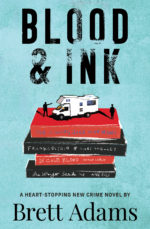Crime writer Brett Adams asks what makes people like a story? Read his new Fremantle Press book and you might just crack the code

If you’re like me when you enjoy a thing, you want others to share that joy. The drunk bellowing over your shoulder at the football game might be irksome, but doesn’t it beat being an audience of one? This is particularly so if you’re a writer. Sure, we should write for ourselves (goes the advice), write the book we’d love to read, but it certainly feels good when a reader gets your story. And likes it!
Which begs the question – what do people like in a story?
For me, a mixture of the following goes a long way:
New knowledge – of a place, a profession, an artifact, or a custom. It can be as exotic as ninja etiquette in feudal Japan, or as prosaic as the carpentry of the mitre joint, but learning is a powerful ingredient of a good story.
The surprise that was inevitable. For Aristotle, each action must lead inevitably to the next, creating an unbroken chain of cause and effect, and do so without resort to a deus ex machina. No plot-hole fairies. No sonic screwdrivers. Yet, for the reader, this inevitability should be retrospective. The plot must surprise.
The list goes on. But one item I’m finding increasingly essential is … well, I’m having trouble defining it.
How’s this:
It’s whatever that thing is beneath a narrative’s surface of description and dialog, of characters and events, that makes it cohere. Makes it organic. That breathes significance into every word. It makes the difference between loving parts of a book, and loving the book.
You could call it story logic, but logic sounds so dry. This thing comprises a world of connections and values that the author will always know better than you, but perhaps only a little better. It creates a feeling of confidence that he or she is taking you somewhere worthwhile. You’re in safe hands. You can relax and enjoy the ride… if enjoyment is their intention.
I get this sensation when reading Raymond Chandler. In the following passage you know hard-boiled detective Phillip Marlowe isn’t simply admiring the ocean:
‘I braked the car against the curb and switched the headlights off and sat with my hands on the wheel. Under the thinning fog the surf curled and creamed, almost without sound, like a thought trying to form itself on the edge of consciousness.’ – The Big Sleep (1939)
This passage comes just before Marlowe asks a question of his female companion that cuts to the root of the novel’s mystery. Chandler is telling you that, below the surface, all is well. The story is not simply moving toward an external climax – that would be melodrama – but toward an internal climax, that will have enduring relevance.
This thing I’m talking about doesn’t have to be big or complex. Too large and it will break the surface and reveal all of its man-made flaws, or collapse under its own weight. The Matrix worked because of its unknowns. The sequels exposed far too much of the foundation – and broke the magic.
Books with this quality are the ones you read again. If all a book offers is a sequence of events, why would you want to go over that ground again? But if the book holds something below and beyond, that you only glimpsed last time, well perhaps this time you will grasp it. No doubt to have it wriggle from your fingers like a slippery fish.
I’ve a hunch that you could pick any book whose popularity has endured, and it’ll have this indefinable quality. If you, writer, crack the secret, you’ll have the three-step book of the century. All you need do is quantify what unites classics as diverse in style as The Adventures of Augie March and The Old Man and the Sea; in size as War and Peace and The Great Gatsby; and in genre as Lord of the Flies and The Lord of the Rings. For proof that you’ve nailed the formula, you could start by predicting whether or not the Harry Potter series will remain among those books loved for having this uncertain something.



